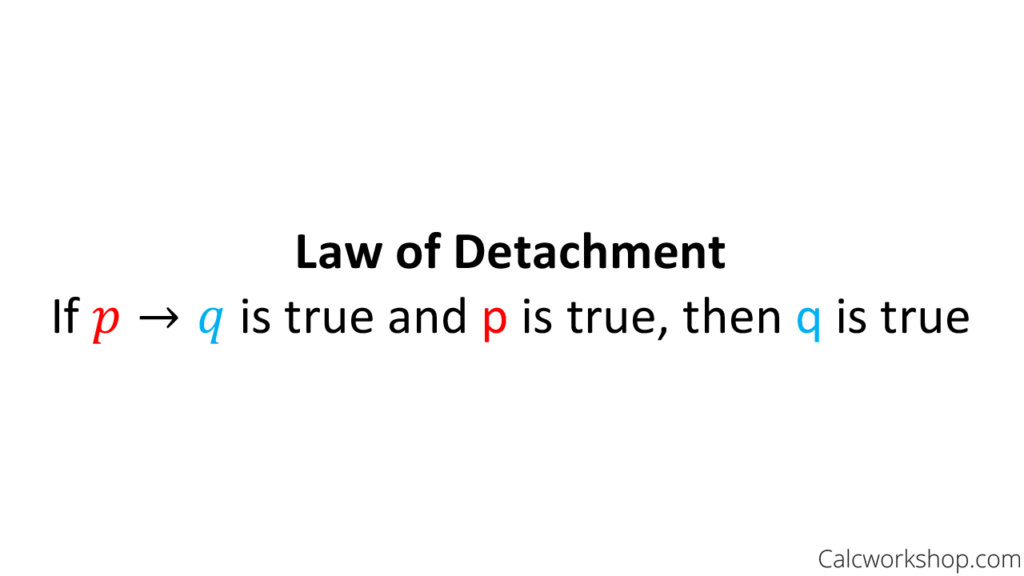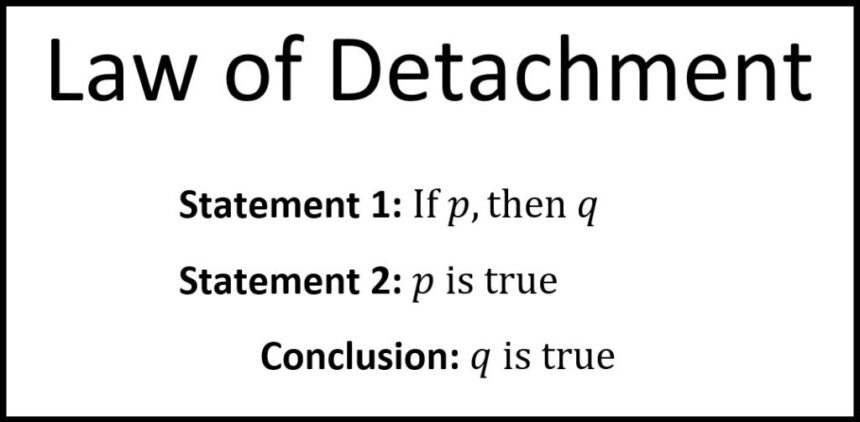The Law of Detachment is a fundamental principle used in logic, philosophy, and everyday thinking. It helps us make connections, understand cause-and-effect relationships, and draw clear conclusions based on established facts. While it might sound complex, the law of detachment is a simple yet powerful tool that anyone—even a 10-year-old—can grasp and use to make better decisions. In this guide, we’ll break it down step by step so everyone can understand what it means, how it works, and why it’s so important.
What Does the Law of Detachment Mean?
At its core, the Law of Detachment is a logical principle that allows us to make valid conclusions based on a conditional statement. A conditional statement typically looks like this:
“If A happens, then B will happen.”
The law of detachment states that if the first part (A) is true, then we can confidently conclude that the second part (B) is also true. It is also known as modus ponens in formal logic, which means “mode that affirms.”
For example:
- If you study hard for your exam, then you will pass.
- You studied hard for your exam.
- Therefore, you will pass.
This simple logical process can be applied to many real-life situations, making it a valuable tool for thinking critically, solving problems, and making decisions.
How Does the Law of Detachment Work?
The law of detachment works by connecting facts and outcomes. It relies on the idea that when we know one thing is true, we can predict the result based on the conditions we’ve set. To use it effectively, we need two things:
- A conditional statement: This is a statement with two parts—a condition (the “if” part) and a result (the “then” part).
- Proof that the condition is true: If the condition is met, the result automatically follows.
Here’s a breakdown of the process:
- Step 1: Start with a conditional statement. For example, “If it rains, then the ground will be wet.”
- Step 2: Confirm that the condition (it rains) is true.
- Step 3: Conclude that the result (the ground will be wet) is also true.
This logical flow ensures that our reasoning stays accurate and valid. It is widely used not only in everyday situations but also in fields like mathematics, philosophy, and computer programming.
Real-Life Examples of the Law of Detachment
To better understand how the Law of Detachment applies in real life, let’s look at some common examples.

If You Study, You’ll Pass
Imagine you are preparing for a big exam. The conditional statement might be:
“If you study regularly, then you will pass the exam.”
Now let’s say you actually put in the effort and study regularly. According to the law of detachment, you can confidently conclude that you will pass the exam. This example shows how the law works in academic success—effort leads to results.
Sports Practice and Winning
In sports, the law of detachment is often at play. For example:
“If a basketball player practices shooting every day, then they will improve their accuracy.”
If the player indeed practices every day, the result (improving accuracy) will naturally follow. This example highlights how the principle applies to skill-building and achieving goals.
Why Is the Law of Detachment Important in Logic?
The Law of Detachment is a cornerstone of logical reasoning. It helps us make sound arguments, avoid confusion, and think critically. Without this principle, it would be much harder to draw reliable conclusions or make decisions based on facts.
One reason the law is so important is that it eliminates guesswork. By using clear, factual conditions and results, it ensures that our reasoning is both valid and consistent. It’s like a roadmap that guides us from a starting point (a condition) to a destination (a result) without taking any wrong turns.
For example:
- Conditional statement: “If a car’s engine is running, then the car will move forward.”
- Observation: The engine is running.
- Conclusion: The car will move forward.
This kind of logical reasoning is the foundation of many disciplines, from science to law to everyday problem-solving.
How the Law of Detachment Is Used in Arguments
The Law of Detachment plays a key role in constructing and analyzing arguments. When we debate or discuss ideas, we often rely on logical reasoning to support our points. By using the law of detachment, we can ensure that our arguments are valid and persuasive.
Here’s how it works:
- Present a conditional statement that is clear and factual.
- Provide evidence that the condition is true.
- Use the law of detachment to draw a conclusion that logically follows.
For example, in a discussion about climate change:
- Conditional statement: “If we reduce greenhouse gas emissions, then global temperatures will stabilize.”
- Evidence: Greenhouse gas emissions have been reduced.
- Conclusion: Global temperatures will stabilize.
This logical flow makes arguments more convincing and helps us avoid faulty reasoning.
The Law of Detachment in Philosophy
The Law of Detachment has deep roots in philosophy, where it is used to analyze ideas, connect concepts, and explore cause-and-effect relationships. Philosophers often use this principle to examine ethical dilemmas, societal issues, and the nature of truth.

The Law of Detachment in Philosophy
In philosophy, the law is often applied to moral and ethical reasoning. For example:
- Conditional statement: “If lying harms others, then it is wrong to lie.”
- Evidence: Lying does harm others.
- Conclusion: It is wrong to lie.
This kind of reasoning helps philosophers construct logical arguments about right and wrong, justice, and fairness.
Connecting Ideas with Cause and Effect
The law of detachment also helps us understand cause-and-effect relationships, which are central to philosophical inquiry. By identifying conditions and results, we can uncover the underlying principles that govern human behavior, natural phenomena, and societal trends.
Why This Law Is a Key to Critical Thinking
Critical thinking is all about analyzing information, questioning assumptions, and drawing sound conclusions. The law of detachment is a key tool in this process because it provides a clear framework for reasoning. By applying the law, we can evaluate arguments, identify flaws, and make informed decisions.
Can Kids Understand the Law of Detachment?
Yes! The Law of Detachment is simple enough for kids to understand and use in their everyday lives. By teaching children this principle, we can help them develop strong reasoning skills and make better choices. For example:
- Conditional statement: “If you finish your homework, then you can play video games.”
- Observation: You finished your homework.
- Conclusion: You can play video games.
This example shows how the law of detachment can be introduced to children in a way that’s easy to understand and apply.
The Bottom Line
The Law of Detachment is a simple yet powerful principle that helps us think clearly, make decisions, and solve problems. Whether we’re studying for an exam, debating a topic, or teaching kids how to reason logically, this law provides a reliable framework for understanding cause and effect. By mastering the law of detachment, we can improve our critical thinking skills and make better choices in every area of life.







